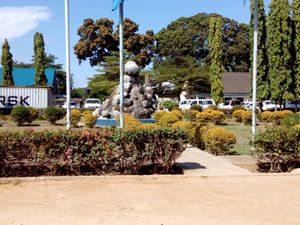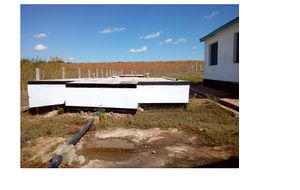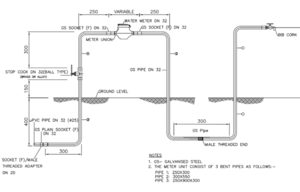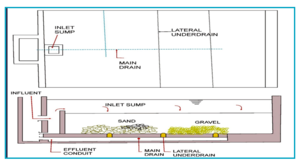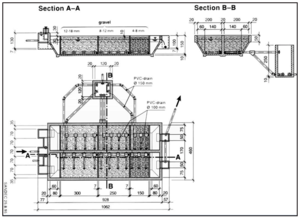Difference between revisions of "Tanzania Ministry of Water Design Manual 4th Edition"
| Line 53: | Line 53: | ||
== Appendix G: Water Treatment == | == Appendix G: Water Treatment == | ||
This section presents various drawings related to Water Treatment | This section presents various drawings related to Water Treatment | ||
| − | [[File:Model1.png| | + | [[File:Model1.png|300px|thumb|left|House Water Connection Model]] |
| − | [[File:Sandfilter.png| | + | [[File:Sandfilter.png|300px|thumb|right|Sand Filter]] |
| − | [[File:Roughingfilter.png| | + | [[File:Roughingfilter.png|300px|thumb|center|Layout of Horizontal-Flow Roughing Filter]] |
===Appendix G.1: Slow Sand Filter (SSF) (Source: Water Supply Design Manual (2013), Uganda )=== | ===Appendix G.1: Slow Sand Filter (SSF) (Source: Water Supply Design Manual (2013), Uganda )=== | ||
Revision as of 12:36, 12 February 2020
Contents
- 1 VOLUME I: DESIGN OF WATER SUPPLY PROJECTS
- 1.1 Introduction
- 1.2 Genesis/Background
- 1.3 Rationale
- 1.4 Organisation/description of the manual
- 1.5 ESIA and EIA Compliance
- 1.6 Water supply
- 1.7 Design of Infrastructure: intakes, rising main pipelines, break pressure tanks, washout & air release values, various different valves, storage tanks, distribution pipelines, water points & soak pits
- 2 Annex I: Drawings
- 3 Appendix G: Water Treatment
- 4 Annex I: Drawings
- 5 References
1 VOLUME I: DESIGN OF WATER SUPPLY PROJECTS
1.1 Introduction
The existing design manual for water supply [1] and wastewater disposal (3rdedition) was formally adopted by the Ministry that was responsible for Water in 2009 and it consists of three parts namely; volume I on Water supply, volume II on Wastewater disposal and volume III on Water pipelines standards and specifications. Since it is now nearly ten years since the third edition of the design manual was adopted and in the meantime, many scientific and technological changes have taken place including the conclusion of MDGs and adoption of the SDGs in 2015 as well as learning some useful lessons out of implementation of the WSDP I and WSDP II (which is still ongoing); it is felt it is high time to revise the design manu
1.2 Genesis/Background
The existing design manual for water supply and wastewater disposal (3rdedition) was formally adopted by the Ministry that was responsible for Water in 2009 and it consists of three parts namely; volume I on Water supply, volume II on Wastewater disposal and volume III on Water pipelines standards and specifications. Since it is now nearly ten years since the third edition of the design manual was adopted and in the meantime, many scientific and technological changes have taken place including the conclusion of MDGs and adoption of the SDGs in 2015 as well as learning some useful lessons out of implementation of the WSDP I and WSDP II (which is still ongoing); it is felt it is high time to revise the design manual.
1.3 Rationale
The existing design manual for water supply and wastewater disposal (3rdedition) was formally adopted by the Ministry that was responsible for Water in 2009 and it consists of three parts namely; volume I on Water supply, volume II on Wastewater disposal and volume III on Water pipelines standards and specifications. Since it is now nearly ten years since the third edition of the design manual was adopted and in the meantime, many scientific and technological changes have taken place including the conclusion of MDGs and adoption of the SDGs in 2015 as well as learning some useful lessons out of implementation of the WSDP I and WSDP II (which is still ongoing); it is felt it is high time to revise the design manual.
1.4 Organisation/description of the manual
The existing design manual for water supply and wastewater disposal (3rdedition) was formally adopted by the Ministry that was responsible for Water in 2009 and it consists of three parts namely; volume I on Water supply, volume II on Wastewater disposal and volume III on Water pipelines standards and specifications. Since it is now nearly ten years since the third edition of the design manual was adopted and in the meantime, many scientific and technological changes have taken place including the conclusion of MDGs and adoption of the SDGs in 2015 as well as learning some useful lessons out of implementation of the WSDP I and WSDP II (which is still ongoing); it is felt it is high time to revise the design manual.
1.5 ESIA and EIA Compliance
The existing design manual for water supply and wastewater disposal (3rdedition) was formally adopted by the Ministry that was responsible for Water in 2009 and it consists of three parts namely; volume I on Water supply, volume II on Wastewater disposal and volume III on Water pipelines standards and specifications. Since it is now nearly ten years since the third edition of the design manual was adopted and in the meantime, many scientific and technological changes have taken place including the conclusion of MDGs and adoption of the SDGs in 2015 as well as learning some useful lessons out of implementation of the WSDP I and WSDP II (which is still ongoing); it is felt it is high time to revise the design manual.
1.6 Water supply
The existing design manual for water supply and wastewater disposal (3rdedition) was formally adopted by the Ministry that was responsible for Water in 2009 and it consists of three parts namely; volume I on Water supply, volume II on Wastewater disposal and volume III on Water pipelines standards and specifications. Since it is now nearly ten years since the third edition of the design manual was adopted and in the meantime, many scientific and technological changes have taken place including the conclusion of MDGs and adoption of the SDGs in 2015 as well as learning some useful lessons out of implementation of the WSDP I and WSDP II (which is still ongoing); it is felt it is high time to revise the design manual.
1.7 Design of Infrastructure: intakes, rising main pipelines, break pressure tanks, washout & air release values, various different valves, storage tanks, distribution pipelines, water points & soak pits
1.7.1 Design of water supply networks
1.7.2 Types of networks (e.g. grid, loops, etc.)
1.7.3 Design methodologies
1.7.4 Transmission main
1.7.5 Distribution network
1.7.6 Storage tanks
1.7.7 Units costs
1.7.8 Gravity schemes
1.7.9 Pumping systems
2 Annex I: Drawings
- Configuration settings list
- MediaWiki FAQ
- MediaWiki release mailing list
- Localise MediaWiki for your language
- Learn how to combat spam on your wiki
3 Appendix G: Water Treatment
This section presents various drawings related to Water Treatment
3.1 Appendix G.1: Slow Sand Filter (SSF) (Source: Water Supply Design Manual (2013), Uganda )
- Configuration settings list
- MediaWiki FAQ
- MediaWiki release mailing list
- Localise MediaWiki for your language
- Learn how to combat spam on your wiki
4 Annex I: Drawings
- Configuration settings list
- MediaWiki FAQ
- MediaWiki release mailing list
- Localise MediaWiki for your language
- Learn how to combat spam on your wiki
5 References
Ref01 - Juma Lungo
- ↑ Ref01
